Roses Under the Miombo Trees (17 page)
Read Roses Under the Miombo Trees Online
Authors: Amanda Parkyn
Romance â and oil supplies
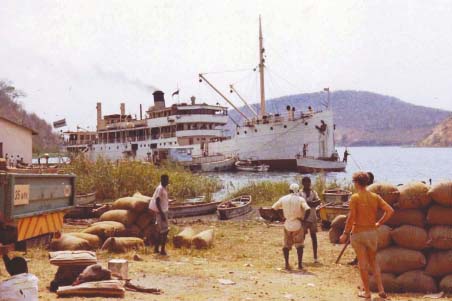
Mpulungu: S.S. Liemba, sacks of dried fish and brother Simon (R)
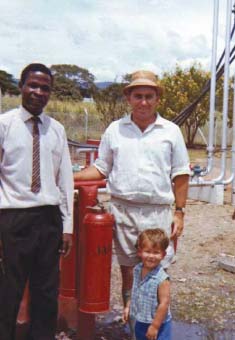
Mark, his clerk and Paul at Mpulungu depot
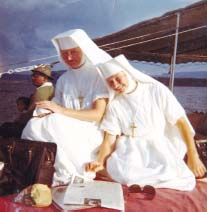
Sisters Romana (L) and Amabilis: a day off on the lake
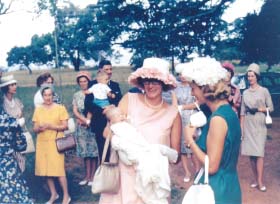
Hats and gloves for Caroline's Christening: Caroline with her godmother Jiff and me, plus guests

Kalambo Falls: holding Paul tight, with his Cape Town granny
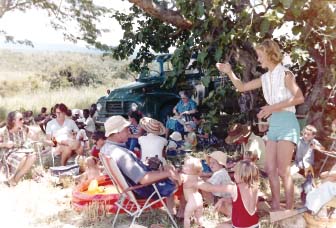
Lake Tanganyika regatta picnic: self proposing a toast as Caroline balances against Dad's knee, centre foreground
Abercorn â a very particular place

Sometimes, still, I will meet someone who was âout in Africa' â Rhodesia, they might say, perhaps Northern Rhodesia for a while. Place names are exchanged and â surprisingly often considering its size â Abercorn is mentioned. âI lived there', I will say, and we'll smile at each other: âAh yes, Abercorn â¦' For it was indeed a very particular place.
I say âwas' not only because it is called Mbala now, having reverted after independence to its pre-colonial name, but because the Abercorn I knew and the life I led there as a very young woman revolved around a community of some 200 white people, a colonial settlement that was, we found, already changing. But I am getting ahead of myself. In June 1963 the little weekly Dakota delivered Paul and me to Abercorn's airfield through bumpy turbulence and into a rainstorm. How mightily relieved I had been to escape the Copper Belt where we had spent a fortnight best forgotten: while Mark was in the office on his induction, I had attempted to manage with Paul and nothing to do in the hotel from hell. It was a struggle to get the kitchens to produce anything suitable for a toddler's meals, let alone when he needed them; there was no safe place for him to play or run around and oddly, no hospitality forthcoming from local company wives. And I was suffering from morning sickness, this time much worse than with my first pregnancy.
There was therefore something deeply comforting about being met off the plane by a friendly face â Audrey Scotcher, wife of Mark's predecessor, with two of her six children in tow. âWe'll go to the hotel later,' she said, âfirst we're out to tea'. From her car I glimpsed a main street of sorts, with a couple of general stores, some kind of municipal office building, then bungalows, widely spaced along dirt roads, with flat-topped spindly African trees â âmiombo' I later learned â through which shone little Lake Chila, Audrey pointing out the Yacht Club's boat house on the opposite bank.
So, over cups of tea, the second person I met was Jennifer Bowmaker, whose husband, Alan, was a provincial fisheries officer, their little Jeanne a year younger than Paul. Children and their toys at our feet, we discovered we had good friends in Cape Town in common; somehow that anchored me, gave me a sense of being in a place not so strange after all, however far it might be from âcivilisation'.
We were to rent a house, but the Scotchers', although overlooking Lake Chila, was too large and expensive for us and we were advised that other possibilities were coming up. Meanwhile the Lake View Hotel outside town fulfilled its name, the view this time being over Lake Tanganyika some twenty miles and two thousand feet below. And beyond, in the far distance, I could see for the first time the misty blue bulk of high mountains behind which, I knew, lay the Congo. I thought of it with a sort of dread, for all its violence, coup and counter-coup continued to be regularly reported in the papers, with the exploits of mercenary forces, the seemingly endless slaughter and bloodshed. The hotel though was restorative, being everything the previous one had not been:
âso easy with Paul, gardens all round, no road worry, large verandah, meals easily got and a nice manageress ⦠the car won't be here for a week
[it was being transported by road]
but I don't need one till we settle a house ⦠The planes come in Weds/ Thurs, NB for posting ex U.K Sun/Mon
. My mother underlined this last bit of that first letter from Northern Rhodesia, for it was to dictate a schedule which was to become an important feature in our respective weekly routines.
Abercorn was where we were to live, but much of the focus of Mark's job as an oil company rep. was elsewhere. Firstly he had a huge geographical area to cover, albeit sparsely settled, on very rough dirt roads, dusty in the dry season, often all but impassable in the rains. And then there was the company depot down at Mpulungu, a small fishing port on Lake Tanganyika. Every alternate Sunday the S.S. Liemba steamed down the lake from Kigoma in Tanganyika, towing a petroleum products laden barge, to be discharged into the company's storage tanks. This routine, together with the size of his âpatch', was to make substantial demands on Mark and on our life together.
Over those first weeks we began to get our bearings. Abercorn stood â Mbala still stands â on the escarpment above Lake Tanganyika at the end of the western Great Rift Valley. It was Northern Rhodesia's most northerly town, and on early maps of Southern Africa in the 1890's there it is, marking the British Empire's stake in the region. Now however it lay at the end of the Great North Road, most of which was unmetalled, and as we had been warned, was also some 400 miles from the nearest railhead, with all the implications for access to supplies. It is also the country's highest town, some 5,400 feet (1670 m) above sea level, which meant that despite being so much closer to the Equator than where we had been living, the climate was pleasant, avoiding the extreme heat that met you as you descended to Mpulungu. Among its 200 or so white residents â the âEuropeans' â were the settlers on their outlying farms, civil servants with the Northern Rhodesia Government, others working for related organisations. There was a town management board for a township area that included around 3,500 Africans of the Bemba tribe, these latter still mainly living at that time in Mbulu township a short distance from the âcentre'. Two hospitals were run by nuns of a Roman Catholic order, the Sisters of the Sacred Hearts of Jesus and Mary, one in the township, the other a bungalow near Lake Chila opened only for the occasional white patient. Abercorn was headquarters of the International Red Locust Control Service (IRLCS), its planes and later helicopters monitoring and spraying the marshlands of Northern Rhodesia's Mweru swamp and the Rukwa Valley in southern Tanzania. The organisation was shrinking now and its staff houses becoming available to rent.
The political situation was very different from our previous postings too. I should admit here that it was only recently that I fully understood the difference between a colony (for example Southern Rhodesia) and a protectorate, which was Northern Rhodesia's current status. Whilst the former had always been left pretty much to its own devices, with a British-appointed Governor General, the latter was run by an administrative service recruited, trained and employed by the Colonial Office in London. Its people worked even in the remotest corners of the country, administering everything from justice to health to infrastructure development, and working closely with local chiefs. All this is vividly described in Ian Mackinson's autobiography
Footprints in the Dust
in his account of his years as one of those administrators. As I now recognise, it was a world away from my own English-speaking, small town based experience of life in the country.